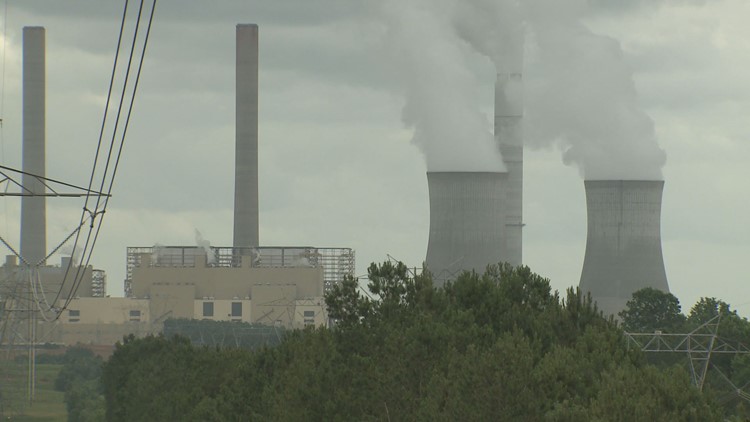JULIETTE, Ga. -- From a distance, Plant Scherer looks like a nuclear plant. But it's actually a coal plant located north of Macon. It's identified by environmentalists as the dirtiest power plant in America.
"Georgia Power has been allowed to dump dangerous carbon into the air forever," said Colleen Kiernan of the Sierra Club's Georgia chapter. She says the Obama administration's new regulations would force Georgia Power to cut back its carbon dioxide emissions by more than forty percent over the next decade and a half.
But Kiernan says Georgia Power has already made impressive strides toward cleaner power.
"Since 2005 Georgia has already reduced carbon dioxide emissions by 22% at our power plants. So we're already well on the way. And you can tell our air is cleaner," Kiernan said. "We have far fewer smog alert days than we used to in the early 2000s.
But coal is cheap, plentiful and produced in the US. Nine of Georgia Power's plants are coal-fired, producing 35 percent of the state's power. But Georgia Power is shutting down most or all of three of its coal plants in the next year.
"The mix is changing. With the retirements of a number of coal units, our percentages will shrink in terms of coal. But coal remains a vital source," said John Kraft, spokesman for Georgia Power. As to Plant Scherer, Kraft says it gets dubbed "dirtiest" because it is one of America's largest coal plants.
Because it is almost prohibitively expensive to clean up the emissions from coal plants, the new regulations are expected to force power companies to shift the emphasis of their power sourcing away from coal to other cleaner sources by 2030.
Georgia Public Service Commissioner Stan Wise said Monday evening that the PSC has cut air pollution from power plants "close to 90 percent" since 1990, and the dirty emissions continue to decrease. The cost of meeting an accelerated deadline of 2030, he said, will be expensive for Georgia electric customers.
"We're expanding solar, we're buying some wind, we're doing the right things. But to go ahead and say, 'You're going to do this in the next 15 or 20 years' really puts a real onus on the state. It's the federal government directing how we're going to dispatch [power] generation, so it's going to cost more money.... If you have to cut emissions by 2030, there's going to be significant, new costs. This is despite the fact that we've already made great headway in the last few years. Significant movement in that area. Leave us alone. We'll take care of this business..... I am confident that we'll continue to get these things done, and not do it with the rate shock that's associated with some of these rules that come out of a Washington bureaucracy."
Stephanie Stuckey Benfield, the Executive Director of GreenLaw in Atlanta, said Monday that the proposed regulations give states flexibility in how they choose to comply, in order to minimize big jumps in electric bills that might result from the costs of complying.
But, she said, there are other costs to Georgians from even the current, lower levels of air pollution, "The incredible health care costs that are caused by coal-fired pollution. The asthma rates, the respiratory illness rates, the heart ailment rates. All of these are incredible costs to states, as well.... We're headed in the right direction.... What we're pushing for is that we need to be more aggressive with [aquiring] renewable energy. Clean forms of energy, like wind and solar, in our country."



